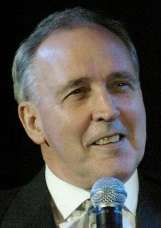Gary Johns
| The Honourable Gary Johns | |
|---|---|
| Member of the Australian Parliament for Petrie | |
|
In office 11 July 1987 – 2 March 1996 | |
| Preceded by | John Hodges |
| Succeeded by | Teresa Gambaro |
| Personal details | |
| Born |
29 August 1952 Melbourne, Victoria |
| Nationality | Australian |
| Political party | ALP |
| Alma mater | Monash University |
| Occupation | Writer |
Gary Thomas Johns (born 29 August 1952) is an Australian writer and former politician.
Political career
Johns was born in Melbourne, Victoria and received a Bachelor of Economics and a M.A. from Monash University. He was elected as the member for Petrie in 1987, and held it for the Australian Labor Party until his defeat in 1996. He served as Assistant Minister for Industrial Relations from December 1993 and Special Minister of State and Vice-President of the Executive Council from March 1994 until the defeat of the Keating government in 1996, in which he lost his seat to Liberal candidate Teresa Gambaro.[1]
Later career
Since his defeat, Johns has drifted from the ALP and has been critical of his old party. Johns told Brett Evans that he might still be a member of the ALP but Evans says that in Johns' heart he has moved on from the ALP.[2]
From 1997 to 2006, he was a senior fellow at the neo-liberal/conservative think tank the Institute of Public Affairs (IPA). Within the IPA, he was head of the Non-Government Organisations unit. From 2006-2009 Johns worked with a consultancy firm, ACIL Tasman. In 2009 he was appointed Associate Professor of Public Policy at the Australian Catholic University's Public Policy Institute. In 2012 he was appointed visiting fellow at QUT Business School. He was president of the Bennelong Society, an organisation that advocated the provision of welfare for Indigenous Australians under the same rules as for all other Australians. From 2002-2004 he was appointed Associate Commissioner of the Commonwealth Productivity Commission, an Australian government policy research and advisory body,[3] with the responsibility for an inquiry into the national workers’ compensation and occupational health and safety framework.[4]
He was awarded a PhD in political science in 2001 from the University of Queensland, in 2002 the Fulbright Professional Award in Australian-United States Alliance Studies, Georgetown University in Washington D. C., and in 2003 the Centenary Medal for ‘service to Australian society through the advancement of economic, social and political issues’.
He is columnist for The Australian newspaper, the author of numerous papers and books: Waking up to Dreamtime. Media Masters (2001), Aboriginal Self-determination. Connor Court (2011), Right Social Justice. Connor Court (2012), Really Dangerous Ideas. Connor Court (2013), Recognise What? Connor Court (2014), and The Charity Ball. Connor Court (2014).[5] No Contraception, No Dole. Connor Court (2016).[6]
References
- ↑ "Biography for Johns, the Hon. Gary Thomas". Parliament of Australia. Retrieved 2007-05-27.
- ↑ https://books.google.com/books?id=kFc_i1Bq2SAC&printsec=frontcover#v=onepage&q=Gary%20Johns&f=false
- ↑ "Gary Johns". ACIL Tasman. Archived from the original on 2008-05-22. Retrieved 2008-06-18.
- ↑ Productivity Commission Annual Report 2003-04, Annual Report Series (PDF) (Report). Productivity Commission, Canberra. 2004. p. 51. Retrieved 2008-06-18.
- ↑ Connor Court
- ↑ Connor Court
| Political offices | ||
|---|---|---|
| Preceded by Frank Walker |
Special Minister of State 1994–1996 |
Succeeded by Nick Minchin |
| Vice-President of the Executive Council 1994–1996 |
Succeeded by John Moore | |
| Parliament of Australia | ||
| Preceded by John Hodges |
Member for Petrie 1987–1996 |
Succeeded by Teresa Gambaro |
